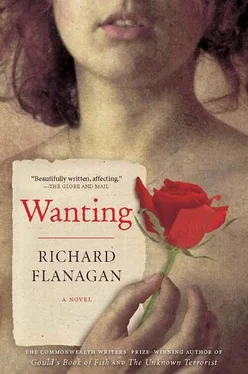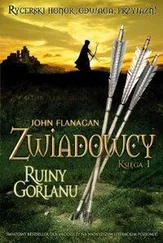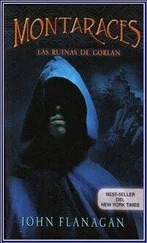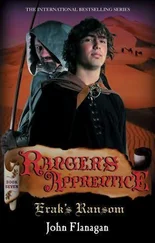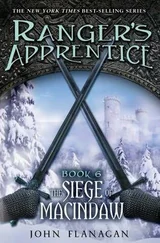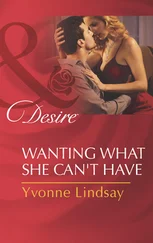Then this thought was replaced by a different voice that whispered how all these things were regrettable but unavoidable, that somehow the stinking hammocks and rats and cold mud and burnt children were for a necessary purpose. It made no sense. But finally her head succeeded in steadying her reckless heart. And Lady Jane recognised the truth of what she was being told: that her great experiment was the most ignominious failure, and that she must not suffer the further humiliation of taking Mathinna home to England. At that moment, everything in that room, in St John’s, smelt to her of wet stone.
She turned away from the window and the sight of that filthy, bedraggled figure. She took a deep breath. None could ever underestimate her courage.
‘What you say accords with common sense,’ she said slowly, stumbling over the words as though it were a confession extracted by some terrible means. ‘I can see that she is simply reverting to her animal nature.’
‘It is what we have worked with before,’ said the Warden gently. ‘There are places for all in our colony’s kitchens and sculleries, Ma’am. But you cannot raise gazelles from rats.’
Lady Jane could see that whatever magic Mathinna had possessed as a small girl on Flinders Island had now vanished. Now she was no longer pretty but dirty and unattractive, no longer delightful and happy but spiteful and miserable. In truth, thought Lady Jane, she has under my care only gone backwards, and can only degenerate further. The dance had left the dancer.
Watching Lady Jane’s carriage return, seeing her enter Government House alone, Sir John hoped he would be seen as callous by more than just his wife. It would help—if only in a small way—restore his standing with the colonists, and with that, he might find some small measure of pride restored. He despised himself for it and despised humanity for it. He recognised it as a conclusive argument for his return to something for which he was in every other respect congenitally unsuited—by weight, by age, by character—the white world of polar exploration. It was the only emptiness he knew greater than himself.
The day after they sailed from Van Diemen’s Land, when there was enough sea between them and the child, in an act that was composed equally of contrition and cunning, Sir John made a gift to his wife of a painting of Mathinna done by the convict Bock shortly before the fateful ball.
She was wearing her favourite red dress, and the picture was marred only by one detail: her bare feet. For Mathinna had, typically, kicked off her court shoes for the sitting and Bock had painted her barefooted. Because it was a watercolour, he did not feel he could paint shoes over the feet, and when, on Lady Jane’s instructions, Bock painted a copy with shoes, it had somehow lost the delightful spontaneity of the original. And so the paintings had been rolled up and stored away and forgotten, until Sir John had the original searched out and framed.
‘It really is a fine likeness of the child when she was at her most admirable,’ he said as the wrapping paper fell to the floor. ‘Predating her rather sorry decline.’
Lady Jane wanted to scream.
With a piece of shaped timber, the framer had achieved more in a moment than she had with her previously invincible will over the last five years. His oval frame neatly cut Mathinna off at her ankles and finally covered her bare feet.
Lady Jane stepped out of the dimness of their cabin into the intense daylight of the quarterdeck. There was a beautiful freshness about the sun, the ship, the wind, the sea. It was as though the world had been born anew. The freshly washed decks steamed; the light broke the sea into a million diamonds.
She turned and strode to the stern. With an uncharacteristically violent motion, she threw the painting in the wake of the ship. It dipped and rode the air as it fell. For a moment it seemed as if it might fly. Then it smacked into the sea, tearing on impact. It quickly drifted away, face down. When she turned, Sir John was standing behind her, black streaks across his forehead as the wind blew his long greased hairs into writhing question marks.
It was 1844. The last pair of great auks in the world had just been killed, Friedrich Nietzsche born, and Samuel Morse sent the first electrical communication in history. It was a telegram that read: What hath God wrought .
‘I loved her,’ said Lady Jane.
DICKENS STOOD ON THE STAGE which would soon transport him to the Arctic, and looked around that marvellous magic theatre. The Manchester Free Trade Hall was as remarkable as anything else in that great shock-city, which, with its huge factories, foundries and mills, its slums, its misery and its riches, was the wonder of the modern world. The theatre had every modern appliance and device. Far above him, a gasman sat on the trapeze fly at his table, operating the best set of gas borderlights and footlights Dickens had seen, while to his left on a perch was the very latest theatrical innovation, a limelight.
Two men stood by that large box of burning lime, their job to keep its fire burning with a giant pair of bellows, prevent the temperamental machine from exploding, while all the time moving its dazzling cone of brilliant white light hither and thither around the stage. Dickens had only heard of this amazing contrivance, and now here he was, about to play within its extraordinary glow.
He stood a desk johnny at centre stage, had the limelight lit and focused on the man’s face. The limelight’s power was extraordinary. It washed colour out. It accentuated wrinkles, jaws, lips. It was clear to Dickens that his make-up would need to be stronger, more pronounced, to take full advantage. He went to the back of the stalls and had the johnny drop and raise his head, move his face in and out of the light, carefully observing the effects of light and shadow, the way in which one might seemingly move like the Devil himself between night and day, the new spaces it opened up for his portrayal of the dying Wardour.
Dickens walked back onto the stage and stood in the brilliant white light. As was the fashion now, the auditorium would be unlit during the performance. He looked down at the pits and was delighted to realise he could see nothing.
He felt a hitherto unknown power and disguise in the white brilliance in which he was bathed, and he realised that what had begun as an amateur theatrical was now going somewhere unexpected and extraordinary. Some of his fellow writers disapproved—Thackeray had said that any vanity is deemed honourable just so long as charity can be named its beneficiary.
Damn Thackeray, thought Dickens. He has posterity. I only have tonight. Damn him! Damn them! Damn them all! He, who was buried, would be resurrected. He, who was dying, encased in pewter, in ice, would now live—if only for a moment—in the blinding white of limelight. And, secure in that dazzle-shaft, with the world beyond finally unseeable, he vowed to imbue Wardour with all he had, to allow his own soul finally to walk naked.
Much to everyone’s relief, the opening night saw a full house. Dickens’ performance was staggering in its intensity and effect. Watching from backstage, Wilkie Collins was overwhelmed. In the wings he could see hardened carpenters trembling and stagehands weeping, and out in the theatre the audience of thousands swam in tears. Wilkie, eyes also moist, leant across to John Forster.
‘It’s wonderful,’ he whispered. ‘But there’s something strange, something not right in the performance.’
Forster looked at him, perplexed. His great friend was triumphant, had risen to a new height—what could be better?
‘Something terrible,’ hissed Wilkie. ‘Can you not see it? It is not acting—it is metamorphosis.’
Читать дальше
